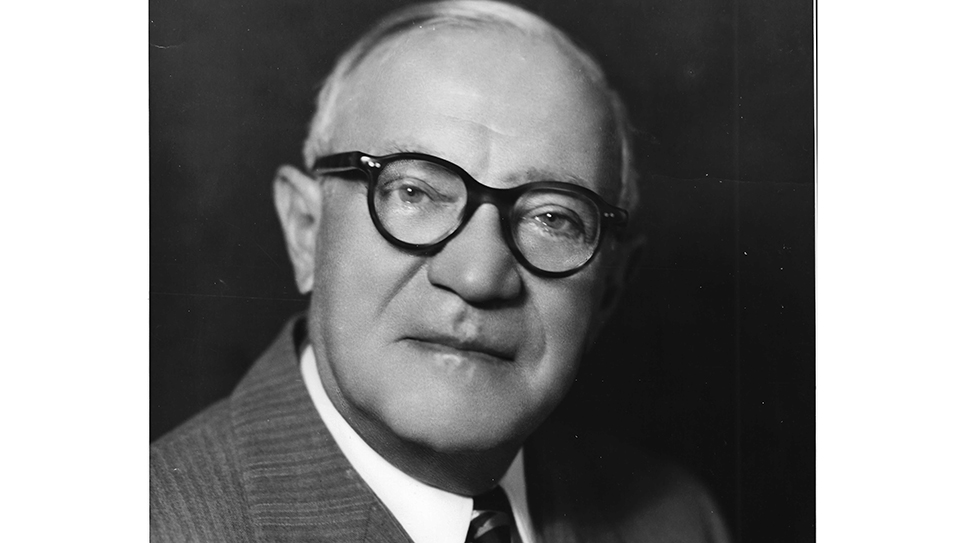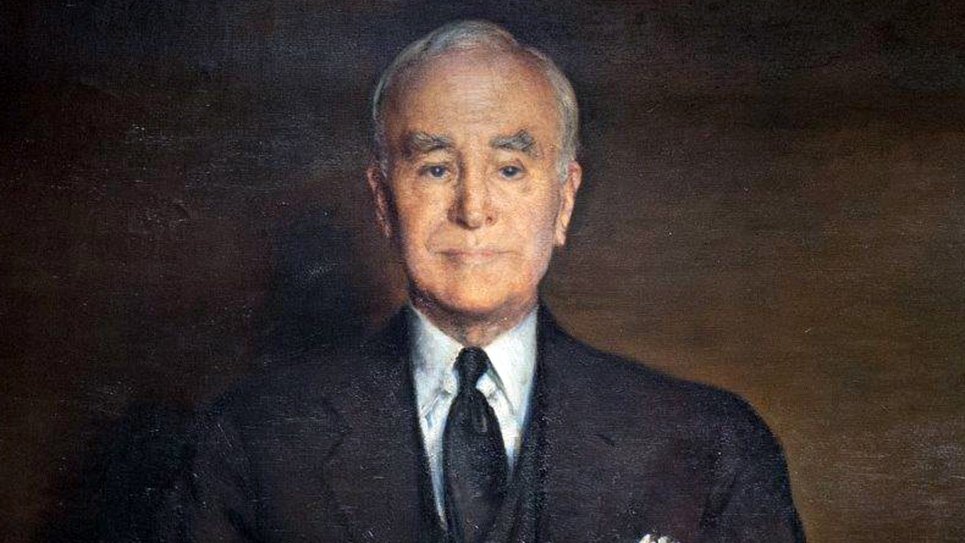Legislative Craftsman: Robert F. Wagner of New York
By Ray Hill
Robert Ferdinand Wagner was born in Germany and rose to become a towering figure in the United States Senate. Eight-year-old Bob Wagner and his parents left their village near Wiesbaden for the United States, where he became one of the most enduring and popular figures in New York State. Wagner had few peers in crafting legislation and the United States Senate website quotes one journalist as writing, “Whether you like his laws or deplore them, he has placed on the books legislation more important and far-reaching than any American in history since the days of the founding fathers.” Certainly, Senator Robert F. Wagner sponsored some of the most notable legislation of the twentieth century. One biographer credited Wagner as the father of urban liberalism.
A short, compact man usually dressed in a double-breasted suit, there was nothing spectacular about Bob Wagner, save perhaps for his ability to turn legislation into law. Wagner’s legislative accomplishments included the Social Security Act, the first real public housing law, the Civilian Conservation Corps, and the Wagner Act. A practical politician, Wagner was once deemed to be “a shrewd weatherman of public opinion.”
Isaiah Berlin regularly sent back confidential reports to the British Foreign Office on various American senators and congressmen and his written portrait of Bob Wagner bears repeating. Berlin described Senator Wagner as “a veteran Tammany statesman, author of the United States labour code and devotee of the New Deal who is respected by the White House for his political acumen within his own State no less than for his political connexions. Greatest champion of the liberal cause in the United States Senate since Norris [Nebraska’s George W. Norris]. A typical anti-Nazi Democrat who has supported all the Administration measures, being usually well in advance of them.”
Bob Wagner’s life was the epitome of an American success story. Wagner’s father was a janitor for a tenement house on New York City’s East Side. Robert F. Wagner had literally risen from the slums, something he never forgot. “That is the most God-awful bunk,” Wagner once said, his voice bitter. “I came through it, yes. That was luck, luck, luck. Think of the others.”
Although less notable than Tennessee’s Senator Kenneth D. McKellar, Bob Wagner had a positive knack for inserting folks into government posts, appointments and positions. If McKellar was the Senate’s premier spoilsman, Wagner, a favorite of the press unlike the Tennessean, was not far behind. McKellar’s association with his friend and political partner Ed Crump was commented upon frequently, but Robert F. Wagner was also affiliated with a political machine. Wagner was a proud member of New York’s Tammany Hall.
Bob Wagner enjoyed a long, eventful political career, first winning election to the New York State Assembly in 1904 and was continuously reelected until 1908 when he was elected to the New York State Senate. It was in the New York General Assembly where Bob Wagner served with Alfred E. Smith, who served as governor from 1919 to 1921 and again from 1923 to 1929. Wagner was a justice of the New York State Supreme Court from 1919 until his resignation in 1926.
The cause of Wagner’s resignation from New York’s high court was his having been nominated for and elected to the United States Senate. Wagner faced Republican incumbent James W. Wadsworth, an exceptionally able member of the U. S. Senate, but one who had seriously angered some elements of his political party, which enabled the Democrat to win the general election. Bob Wagner joined Dr. Royal S. Copeland in the United States Senate and they served together until Copeland died in 1939. From the time of his election in 1926, Bob Wagner became unbeatable, winning reelection in 1932, 1938 and 1944.
Wagner, as a loyal Democrat and member of Tammany, was a supporter of New York Governor Franklin D. Roosevelt for the presidency in 1932. Bob Wagner had known Franklin Roosevelt when the two of them served in the state legislature together.
Senator Wagner was acutely aware of the human suffering caused by the Great Depression and the New Deal afforded him the means to do something about it. Republican majorities in Congress were swept away by the Roosevelt tide and Wagner became one of the most productive members of Congress, at least in terms of legislative accomplishments. Bob Wagner was not a mere legislative wonk with his nose buried in books; Wagner knew something about politics and was a social creature, as are most successful politicians. Senator Wagner lived in the Shoreham Hotel in Washington, D.C., and enjoyed having a drink with his fellow senator and friend James E. Murray of Montana, who also had an apartment at the Shoreham. At the worst of the depths of the Depression, it was Bob Wagner who sponsored the first relief bill providing direct aid to suffering Americans under then-President Herbert Hoover. Since the advent of the Depression, Senator Wagner had insisted it was the federal government’s responsibility to do something about unemployment.
Robert Wagner is perhaps best remembered for his sponsorship of the National Labor Relations Act, better known as the Wagner Act. It legalized collective bargaining through those representatives chosen by workers and compelled employers to negotiate with their employees as a group. The Wagner Act also created national and regional boards to hold elections for the designated bargaining agents while ruling on any charges of unfair labor practices. At the time, the Wagner Act caused disagreements between the country’s two most powerful unions, the AFL and the CIO. The AFL complained the boards were biased on behalf of the CIO and claimed the Wagner Act “encouraged industrial over craft unionism.” Much of the Wagner Act was later superseded by the Taft-Hartley Act.
Bob Wagner’s legislative craftsmanship included a host of things taken for granted by Americans today; unemployment insurance, the regulation of working hours of women and children employed by businesses and industries, widows’ pensions, housing, workmen’s compensation, minimum wage laws and safety codes. Senator Wagner also pushed legislation to appropriate then-unprecedented sums for relief and public works.
Senator Wagner never forgot his humble beginnings and empathized with the less fortunate. “My boyhood was a pretty rough passage,” the senator once said. Wagner recalled how his brother August, a chef in a club, helped to provide money for his college education. Wagner had augmented his meager income by tutoring other students and excelled in debate while in college. Eventually, Wagner became legal partners with Jeremiah T. Maloney in a tiny office, which was a single room and one desk they shared. Maloney later became a justice of the New York State Supreme Court. Bob Wagner’s rise in the Tammany organization began with a telephone call to Harry C. Hart, the district leader in Wagner’s area. Young Wagner volunteered his services as a speaker on behalf of Tammany candidates in the election. Hart gave Wagner a chance and Wagner proved to be an able enough speaker that he became a regular on Tammany platforms. The boss of the Tammany organization, Charles Murphy, later picked Bob Wagner over veteran floor leader Thomas F. Grady, to become the majority leader when the Democrats came to control the state Senate.
Bob Wagner became quite well known in New York due to his leadership in chairing an investigation into the Triangle Shirtwaist Factory fire, an appallingly tragic event that claimed the lives of 147 women. The women workers had died because the doorways to the fire escapes were locked. Recalling the investigation and its aftermath, Wagner said, “The laws we put through then did what Government should do – – – look after those who are unable to look after themselves.”
Acknowledged as one of the ablest men New York Democrats had nominated in decades, Bob Wagner was still viewed as the underdog in his 1926 challenge to U.S. Senator James W. Wadsworth. Wadsworth had angered the “dry” wing of his own party by his unequivocal opposition to prohibition, which ignited the candidacy of an Independent Republican who campaigned as a prohibitionist. That drew away enough votes from Senator Wadsworth to allow Bob Wagner to win.
When New York rewrote its Constitution in 1938, Senator Robert F. Wagner was elected as one of the delegates. Wagner led the faction of Democratic delegates friendly to the New Deal, while another was led by Wagner’s friend Al Smith, who had been elected honorary chair of the convention.
Much of Senator Wagner’s time in the years following the Second World War was occupied by matters of social legislation. With his good friend Jim Murray of Montana and Congressman John Dingell (father of the long-serving representative of the same name who died in 2019), Wagner sponsored the first serious legislation to provide health insurance under the auspices of the federal government. The New Yorker was the prime sponsor of the Wagner-Taft-Ellender Bill to provide low-cost public housing.
The 69-year-old senior senator from New York oftentimes felt unwell during much of 1946 and colleagues saw him less frequently in his seat on the Senate floor. That year Wagner suffered from a severe case of influenza and was in a wheelchair in Manhattan’s Lenox Hill Hospital where he was baptized in the Catholic faith by Monsignor Robert F. Keegan. The senator had been born into the Lutheran denomination, but Bob Wagner had been raised as a Methodist after coming to the United States. Wagner’s late wife had been a Catholic and their son, Robert Jr., had been raised as a Catholic. Evidently, the senator had talked over his potential conversion with his old friend Al Smith before the latter had died.
Senator Wagner was oftentimes plagued by colds and pneumonia. For almost two years, from 1947 through 1949, Senate clerks noted the absence of the senior United States senator from New York. Bob Wagner had been suffering from a heart ailment yet continued holding his seat. There were disquieting rumors the once brilliant senator was no longer as mentally acute as he had once been. What is certain is advancing years had not been at all kind to Robert F. Wagner. Sixty-four years after he had reached the shores of his new homeland from his native Germany, Wagner decided to retire. The senator’s political career had spanned 44 years. Wagner’s farewell to public life came in the form of a written rather than spoken statement. “My turn has come to step down… I have had my fair share of shining hours when the country approved my labors and when I saw the reforms for which I struggled so firmly established that many took them for granted…” Senator Robert F. Wagner resigned his office on June 28, 1949, and moved back to New York where he lived with his son. Once the colleague of the mighty, Wagner’s boon companion in retirement was his young grandson.
On his last day, the former senator enjoyed a good lunch but later complained of shortness of breath. Wagner received the Last Rites of the Catholic Church before he died at 5:45 p.m. on May 4, 1953.
When death claimed 76-year-old Robert F. Wagner in retirement, the accolades poured in, celebrating the former senator’s long public career and his commitment to the less fortunate. George Meany, the president of the AFL, offered a simple and fitting tribute. “Every working man and woman in the nation mourns the passing of Robert F. Wagner.”
Wagner’s son, Robert Jr., became mayor of New York City and sought to reclaim the seat in the U.S. Senate that his father had held. The younger Wagner was the Democratic nominee for the Senate in 1956 against Republican Jacob Javits and lost.
Only in America could a little immigrant boy work hard, get an education and rise to the top of his profession and make such an impact on the society of his adopted country. The changes wrought by the legislative craftsmanship of Robert F. Wagner last to this day.
© 2023 Ray Hill







